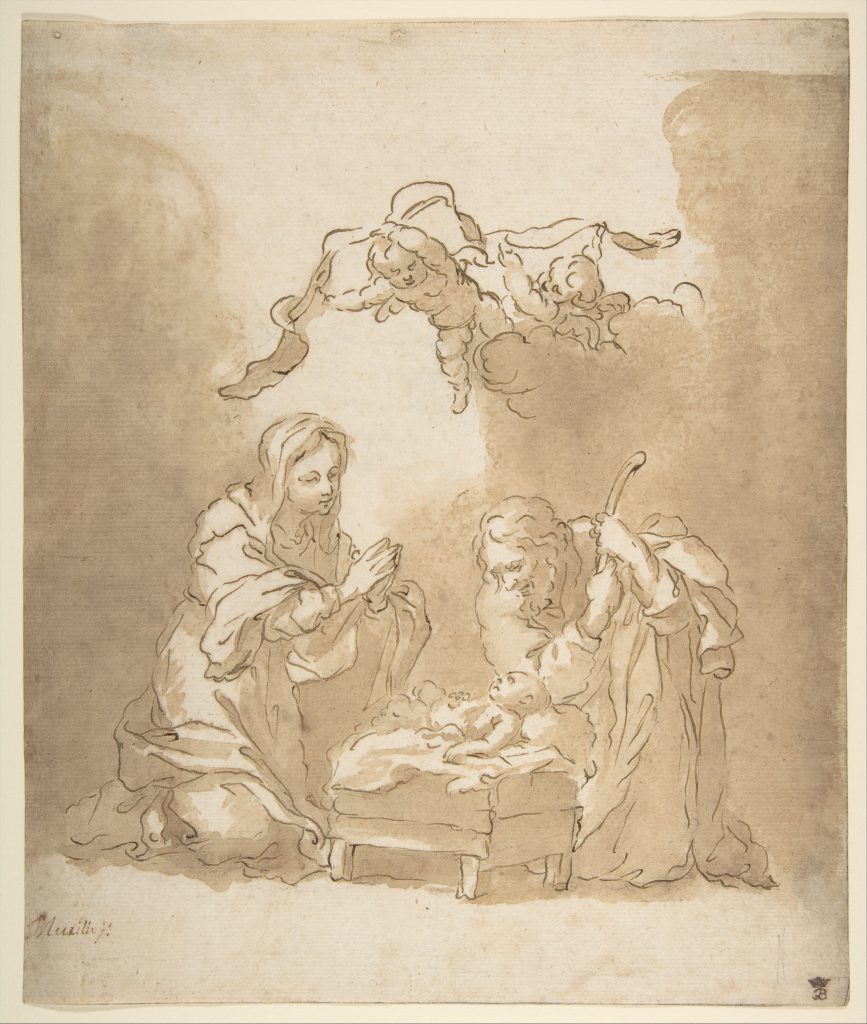The Christmas Octave is underway. It is still Christmas! We should revel in the happy feast and celebrate the mystery of the Word’s incarnation and coming into our midst. Happily, the Church halts her liturgical clock for this Octave so that we can view the mystery from various angles and absorb what we can for another year.
In the spirit of the Octave, here is a piece I wrote for the Christmas issue (21 Dec) of the UK’s best (and now US) Catholic weekly, the Catholic Herald, along with the image that accompanied it.
The image’s deceptive simplicity is of an order accomplished only by a master. Brown ink pen strokes. Brown wash. Traces of black lead. The economy is illusory, the effect alluring. Just so is Bartolomé Estebán Murillos drawing of the Nativity (c 1665) which I spotted in an otherwise disappointing corridor of frequently changed exhibits at New York’s Metropolitan Museum.
The composition isn’t groundbreaking. Baby Jesus lies in a small manger. On the right, at His head, Joseph kneels, leaning on a staff, bent to look into the Child’s face. He exudes protection. At Jesus’s little feet kneels Mary. Prayerful hands thrust forward, she leans in. She is the epitome of longing. Overhead, chubby putti unfurl a ribbon banner. Were it adorned, we would read, “Glory to God in the highest.” The Child lies back comfortably, rather in the manner of one who has just enjoyed a good meal, near left arm languid, head pillow-propped. You can just see the fingers of His far left hand resting by His belly-button. He gazes straight at His mother.
The image, so simple, so delicate, shouts, “I’m here at last. Love me!”
Love is here incarnate. Love is helpless. Love is wholly lovable.
As I looked at this drawing, I sensed a representation of a personal challenge. Perhaps I read it in that moment through the lens of a recent accident I had, the injuries I sustained which force me daily to rely on the kindness of others. In my independence, the self-sufficiency of routine, I don’t easily ask for help when it comes to personal needs, even when ailing. But now, I am constrained to be helpable. I must let people be good to me. In doing so, I am an opportunity for them to be good to someone.
The Incarnate Word, as we read in Gaudium et spes 22, took up our humanity to reveal us more fully to ourselves. In being so lovable, Jesus reveals that each of us are lovable. He asks us to allow ourselves to be lovable and freely to accept His love. As St Elizabeth of the Trinity wrote, “Let yourself be loved.”
Christmas presents us with the God who emptied Himself of glory and became lovableness incarnate. Allow God to love you. Adore and glorify Him in your ways. Love others in words and deeds, especially the love starved. Allow others to love you.



































A magnificent piece and reflection, Father. Thank you!
” I am constrained to be helpable. I must let people be good to me. In doing so, I am an opportunity for them to be good to someone”
Yes, this is beautiful. I have a small very beautiful book that was written by Pope Benedict XVI and in it he speaks about suffering with illness during this Season. It has some very nice artwork. Thank you Fr Z and Pope emeritus Benedict. Peace
This is so beautiful, Father, both the words and the lovely image!
We will keep praying for your recovery.
Thank you Father. A wonderful meditation. Yes, the resistance to be loved.
Dear Father Z,
Thank you for posting your reflection from The Catholic Herald on your blog for us to see. I too am helpless this Advent and Christmas seasons recovering from major surgery and a house full of children. I heard God call me too in a personal challenge when I read your words- summed up perfectly by St Elizabeth of the Trinity “Let yourself be loved.” God wanting me to be helpless so that others have the opportunity to love me. Me bristling at needing. This was so timely this morning.
I pray you have a full recovery,
Merry Christmas!
Thank you for the thoughtful reflection, Father–especially encouraging to those of us who are getting old and having to allow others to do more and more for us. But even more, thank you for the heartwarming picture. One expects moving renditions of the Madonna, and this one is so thoroughly loving; but even better is St. Joseph’s expression. I can’t recall ever seeing him smiling so warmly at the Child before–but, of course he would have!